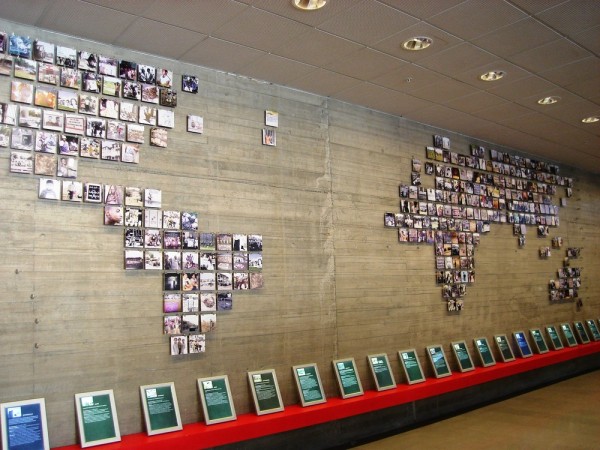The Human Rights Film Festival in Naples will take place next December from 5th to 13th, for the total duration of ten entire days, as a prestigious international event, now in its sixth edition, devoted to fiction and documentary films on issues about human rights and a culture of peace, non-violence and solidarity.
It’s really like a fixed date, whose specificity is to be not the product of a sort of “fabric for great events”, but mostly the result of the engagement and the devotion of one of the most significant networks among those been established in Italy in recent years, named Suspended Coffee Net, which, in its turn, animates and enlives the Coordination of the Human Rights Film Festival itself.
It is a huge network of about forty organizations, local and national ones, all active especially in Naples and the South of Italy, which has chosen to make the international solidarity and cooperation one of the privileged areas of application and intervention and the cinematic and narrative language the privileged tool for exchanging and sharing knowledge and practices so much that is needed to articulate and innovate practices and activities of peace operators, solidarity and cooperation stake-holders, human rights activists and defenders.
One of the grounds of the Human Rights Film Festival this year is inspired by “International Windows” and, among many others (like Argentina, Syria, the Mediterranean), a very special one, for its design and its articulation, is dedicated to the Western Balkans, finding themselves today in a real “crossroads of events”, those of year 2013 that greeted Croatia’s accession and Serbia’s path to European Union, but also the signing of the first dialogue-based agreement between Belgrade and Pristina after the war over Kosovo, and those of year 2014, the centenary of the outbreak of World War I in Sarajevo, that Bosnian Capital will just “celebrate” with several initiatives and events, some of which already created noises and contrasts, and twenty years after one of the hardest years of the Bosnian War, whose effects and consequences are widely felt, and how, up to present days.
The intention is not that of ritual “celebration”, even less the historical “commemoration”; the real intention, rather, is to provide background information on a regional scenario that we, in the so-called “West”, still know little and that continues to be mortified by hateful prejudices and easy stereotypes. But also a good opportunity to update our thinking, to understand the great transformation of countries, once having been part of Socialist Yugoslavia, during the last twenty years, and to update the paths of positive peace and cooperation in synergy with local social and cultural activists.
On December 11th, starting at 09.30 a.m. for the whole morning, will be held, hosted and sponsored by “Suor Orsola Benincasa” University in Naples, the conference entitled “Balkans at Crossroads between Europe and Conflicts”, a reflection on the Balkans twenty years after the war and in the midst of huge transformations and deep contradictions more and more emerging, animated by the contributions of professors, researchers and journalists, Antonello Petrillo and Ottavio Di Grazia, Gianmarco Pisa and Tommaso Di Francesco, Fabio Marcelli, Patrizia Sentinelli and Alessandro dal Lago, along with Kumjana Novakova from HR Film Festival in Sarajevo, and the brilliant filmmaker Sonja Blagojevic, whose film, “Kosma”, in exclusive screening, has already won various awards and prizes, from the “Festival of Ethnographic Film” in Belgrade up to the “RIOS Festival” in Portugal.
Again on December 11th, starting at 05:00 p.m. and throughout the evening, will take place, at the PAN, the prestigious “Palazzo delle Arti di Napoli” (Art Palace in Naples), a round table in the form of a “focus group” open to everyone, with the title “A long time after-war: Western Balkans between memory and cooperation”, an opportunity to take stock of state of the art, innovations and problems in decentralized and international cooperation and work for peace and human rights, with Maurizio Del Bufalo, Gianmarco Pisa, Manuela Marani, Tommaso Di Francesco, Lorenzo Giroffi, Luigi Cafiero, Patrizia Sentinelli and Turi Finocchiaro with his film “Besa of Luce” (Cinema and Human Rights Award in 2009), a beautiful narrative about the difficulty and the courage of memory and reconciliation. An important opportunity, to learn more and be part of a real long collective narrative.










